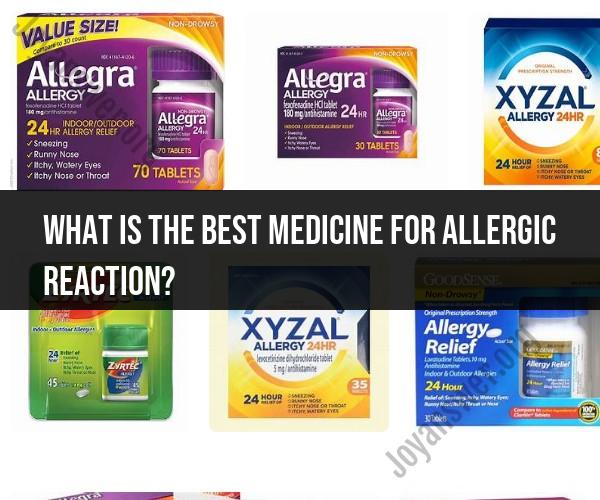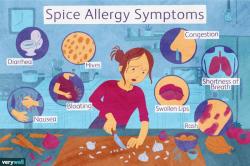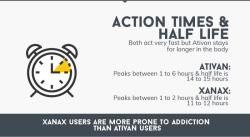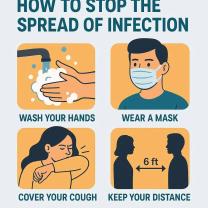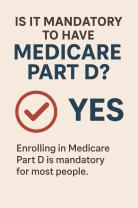What is the best medicine for allergic reaction?
The best medicine for an allergic reaction depends on the severity of the reaction and the specific symptoms you are experiencing. Allergic reactions can range from mild to severe, and the appropriate medication may vary accordingly. Here are some common medications used to treat allergic reactions:
Antihistamines: These are often the first-line treatment for mild allergic reactions. They work by blocking the effects of histamine, a chemical released during an allergic response. Over-the-counter antihistamines like cetirizine (Zyrtec), loratadine (Claritin), and diphenhydramine (Benadryl) can provide relief from symptoms like itching, sneezing, and runny nose.
Epinephrine: For severe allergic reactions, especially anaphylaxis, epinephrine is the most important and immediate treatment. It works by reversing the symptoms of a severe allergic reaction, such as difficulty breathing, swelling of the face and throat, and a drop in blood pressure. Epinephrine auto-injectors like EpiPen are prescribed for individuals with known severe allergies.
Corticosteroids: These medications, such as prednisone or methylprednisolone, are often used to reduce inflammation in more severe allergic reactions. They are typically prescribed by a healthcare provider and may be necessary when antihistamines alone are insufficient.
Bronchodilators: If an allergic reaction causes breathing difficulties, bronchodilators like albuterol may be used to open up the airways and alleviate symptoms of wheezing and shortness of breath.
Decongestants: These can help relieve nasal congestion associated with allergies. However, they should be used with caution and for short periods, as they can lead to rebound congestion if used for an extended time.
H1-antagonist/Decongestant combinations: Some over-the-counter medications combine an antihistamine with a decongestant (e.g., pseudoephedrine) to relieve multiple allergy symptoms, including congestion.
Mast cell stabilizers: These medications, such as cromolyn sodium (NasalCrom) or nedocromil sodium, can be used to prevent allergic reactions in individuals with known triggers, such as exercise-induced bronchoconstriction or specific allergens.
Anticholinergic nasal sprays: Medications like ipratropium bromide (Atrovent) can help relieve severe nasal congestion associated with allergies.
Remember, it's essential to consult a healthcare professional for the proper diagnosis and treatment of allergic reactions, especially if they are severe or recurrent. They can provide personalized advice and prescribe the most suitable medication for your specific situation. Additionally, if you have a known severe allergy, you should carry an epinephrine auto-injector and know how to use it in case of an emergency.
Finding Relief: The Best Medications for Allergic Reactions
Allergic reactions can be mild or severe, and the best medications for treating them will vary depending on the severity of the reaction and the specific symptoms.
Over-the-counter medications are often sufficient for treating mild allergic reactions. The most common over-the-counter medications for allergies are antihistamines, which block the effects of histamine, a chemical released by the body during an allergic reaction. Common antihistamines include:
- Cetirizine (Zyrtec)
- Desloratadine (Clarinex)
- Fexofenadine (Allegra)
- Levocetirizine (Xyzal)
- Loratadine (Claritin)
If you have nasal congestion in addition to other allergy symptoms, you may also want to take a decongestant. Decongestants can help to open up the airways and relieve congestion. Common decongestants include:
- Pseudoephedrine (Sudafed)
- Phenylephrine (Neo-Synephrine)
- Oxymetazoline (Afrin)
Prescription medications may be necessary for treating more severe allergic reactions or reactions that do not respond to over-the-counter medications. Common prescription medications for allergies include:
- Corticosteroids: Corticosteroids are powerful anti-inflammatory drugs that can help to reduce inflammation and other symptoms of allergic reactions. Corticosteroids are available in a variety of forms, including pills, liquids, nasal sprays, and eye drops.
- Mast cell stabilizers: Mast cell stabilizers prevent mast cells, the cells that release histamine, from releasing histamine. Mast cell stabilizers are available in nasal sprays and eye drops.
- Montelukast (Singulair): Montelukast is a leukotriene receptor antagonist. Leukotrienes are chemicals that play a role in allergic inflammation. Montelukast is available in pills and chewable tablets.
Allergic Reaction Treatment: Medicines That Can Help
The best medication for your allergic reaction will depend on the severity of your symptoms and the type of allergen you're exposed to. Here are some of the most common medications used to treat allergic reactions:
- Antihistamines: Antihistamines block the effects of histamine, a chemical that your body releases during an allergic reaction. Antihistamines can help relieve symptoms such as itching, sneezing, runny nose, and watery eyes.
- Decongestants: Decongestants can help relieve nasal congestion caused by allergies. They work by constricting blood vessels in the nose, which reduces swelling and inflammation.
- Corticosteroids: Corticosteroids are powerful anti-inflammatory drugs that can help reduce swelling and inflammation caused by allergic reactions. They're available in a variety of forms, including pills, liquids, nasal sprays, and eye drops.
- Epinephrine: Epinephrine is a hormone that's used to treat severe allergic reactions, such as anaphylaxis. Anaphylaxis is a life-threatening reaction that can cause swelling of the throat and tongue, difficulty breathing, and a drop in blood pressure. Epinephrine is available in auto-injector pens, such as EpiPen and Auvi-Q, which can be used to administer the drug quickly and easily.
If you're experiencing an allergic reaction, it's important to see a doctor right away, especially if your symptoms are severe or if you're having difficulty breathing.
Managing Allergic Responses: Choosing the Right Medication
When choosing a medication to manage your allergic responses, it's important to consider the severity of your allergies, the type of allergen you're exposed to, and your overall health.
For mild allergies, over-the-counter antihistamines are often sufficient. However, if you have more severe allergies or if your allergies don't respond to over-the-counter medications, you may need a prescription medication, such as a corticosteroid or mast cell stabilizer.
If you're unsure which medication is right for you, talk to your doctor. They can help you assess your allergies and recommend the best treatment plan for you.
Here are some additional tips for choosing and using allergy medications:
- Read the label carefully. Before taking any medication, be sure to read the label carefully to understand the dosage instructions, side effects, and drug interactions.
- Start with a low dose. It's generally best to start with a low dose of any new medication and increase the dose as needed. This will help you minimize the risk of side effects.
- Be patient. It may take some time to find the right medication and dosage for you. Don't be discouraged if the first medication you try doesn't work.
- Talk to your doctor. If you have any questions or concerns about allergy medications, be sure to talk to your doctor. They can help you choose the best medication for you and monitor your progress.
